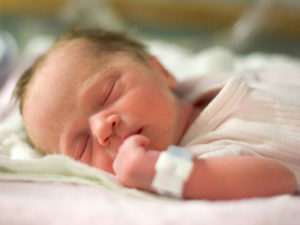 Nice write-up of how what happens from the type of birth (vaginal vs cesarean) affects the baby's microbiome (community of microbes). Remember, it is very complicated and much is still unknown. (UPDATE: see January 16, 2015 post discussing research by Dr. Dominguez-Bello who is conducting a study in which babies born via C-section are immediately swabbed with their mother's vaginal secretions; these babies will then be followed for years). From Gastroenterology and Endoscopy News:
Nice write-up of how what happens from the type of birth (vaginal vs cesarean) affects the baby's microbiome (community of microbes). Remember, it is very complicated and much is still unknown. (UPDATE: see January 16, 2015 post discussing research by Dr. Dominguez-Bello who is conducting a study in which babies born via C-section are immediately swabbed with their mother's vaginal secretions; these babies will then be followed for years). From Gastroenterology and Endoscopy News:
Delivery Mode Alters Newborn’s First Bacterial Exposure
A baby’s first exposure to bacteria varies by the method of delivery, researchers have found. These differences could have health implications later in life, according to an emerging body of evidence that suggests gut bacteria may be important to the development of a healthy immune system (Arrieta MC et al.Front Immunol 2014;5:427). For example, evidence shows that alterations in gut bacteria early in life may increase the incidence of allergies later on (Bendiks M, Kopp MV. Curr Allergy Asthma Rep 2013;13:487-494).
In the new study, presented at the 2014 annual meeting of the North American Society for Pediatric Gastroenterology, Hepatology and Nutrition, a group at the University of Colorado School of Medicine, in Aurora, compared oropharyngeal aspirates taken from 12 infants born by cesarean delivery and 11 born vaginally, and their bacterial content by sequencing the bacterial genes in the samples (abstract 7). Samples taken from the mothers’ vaginal and rectal areas, and samples of the infants’ stool, were also analyzed for bacterial genes.
Bacteria in aspirates from newborns delivered vaginally were more similar to the bacteria found in samples from their mothers than the aspirates from infants born by cesarean delivery, the investigators found. Infants born vaginally had higher numbers of firmicutes (62.6% vs. 30.1%; P=0.0013), particularly lactobacilli typically found in the vagina.
Aspirates from infants born by cesarean delivery, in contrast, had higher levels of Actinobacteria (20.1% vs. 3.8%; P=0.045), which are found on the skin. Stool samples from vaginally delivered newborns also had greater numbers of Bacteroidetes than stool samples from infants born by cesarean delivery. This difference persisted through six weeks of life, the researchers said.
David Brumbaugh, MD, assistant professor of pediatrics at the University of Colorado School of Medicine, in Aurora, said the finding of fewer Bacteroidetes in cesarean newborns is potentially alarming. Studies of mice raised in sterile conditions have shown that exposure to a specific type of Bacteroidetes, Bacteroides fragilis, suppresses the animals’ inflammatory response (Mazmanian SK et al. Nature 2008;453:620-625), he said.
“The fact that this bacteria never gets established early in life [in babies born by cesarean delivery] is concerning,” he said. Some studies have suggested that infants born by cesarean delivery may be at greater risk for developing conditions such as asthma, type 1 diabetes and celiac disease (Cho CE, Norman M. Am J Obstet Gynecol 2013;208:249-254). But not all studies have supported such risks; other studies suggest that genetic factors or the reason for the cesarean delivery itself may contribute to disease later in the child’s life (Almqvist C et al.Clin Exp Allergy 2012;42:1369-1376).
Jean-Eric Ghia, PhD, assistant professor of immunology and internal medicine at the University of Manitoba, in Winnipeg, Canada, said the findings add to a body of evidence suggesting that gut bacterial colonization is affected by mode of delivery, and these altered gut bacteria might contribute to immune system–related disease later in life (Neu J, Rushing J.Clin Perinatol 2011;38:321-331). “The first colonization of the gut happens when the baby comes out,” he said. But he noted that long-term studies are needed to assess the effect of these gut differences on health in the long term. He noted that a multitude of exposures before and after birth can also influence gut biota (Munyaka PM et al. Front Pediatr. doi:10.3389/fped.2014.00109 [published online October 9, 2014]). “It’s really, really complicated,” he said.
